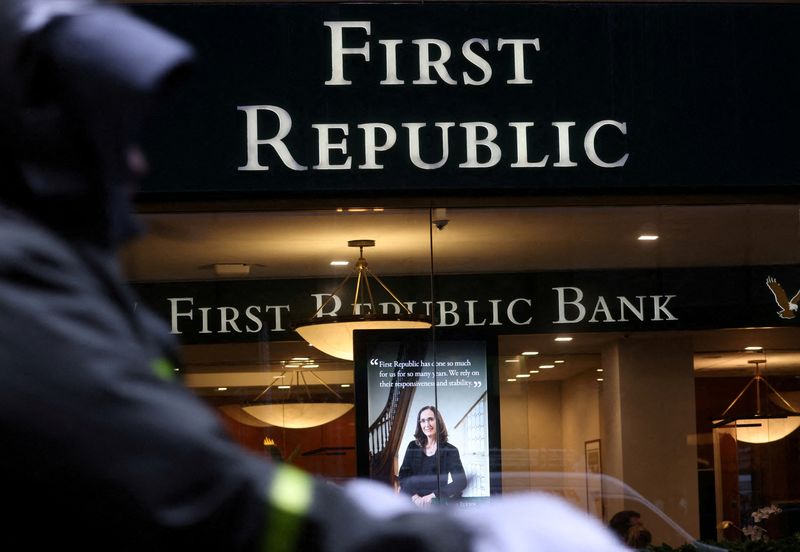By Jonathan Stempel and Anirudh Saligrama
(Reuters) -First Republic Bank saw its credit ratings downgraded deeper into junk status by S&P Global (NYSE:SPGI), which said the lender's recent $30 billion deposit infusion from 11 big banks may not solve its liquidity problems.
S&P cut First Republic's credit rating three notches to "B-plus" from "BB-plus," and warned that another downgrade is possible. Other ratings were also lowered.
The agency said First Republic likely faced "high liquidity stress with substantial outflows" last week, reflecting its need for more deposits, increased borrowings from the Federal Reserve, and the suspension of its common stock dividend.
It said that while the deposit infusion should ease near-term liquidity pressures, it "may not solve the substantial business, liquidity, funding, and profitability challenges that we believe the bank is now likely facing."
Sunday's downgrade by S&P was the second in four days for First Republic, which previously held an "A-minus" credit rating.
It could add to market concerns about the San Francisco-based bank, which has scrambled to assure investors and depositors about its health following this month's collapses of Silicon Valley Bank, which also served many wealthy clients, and Signature Bank (NASDAQ:SBNY).
Another rating agency, Moody's (NYSE:MCO) Investors Service, downgraded First Republic to junk status on Friday.
In a statement following the S&P downgrade, First Republic said the new deposits and cash on hand leave it "well positioned to manage short-term deposit activity. This support reflects confidence in First Republic and its ability to continue to provide unwavering exceptional service to its clients and communities."
The statement echoed a joint statement on Thursday from the four largest U.S. banks--JPMorgan Chase & Co, Bank of America Corp (NYSE:BAC), Citigroup Inc (NYSE:C) and Wells Fargo (NYSE:WFC) & Co--that together deposited $20 billion.

First Republic shares plunged 32.8% on Friday to $23.03, reflecting concern that more trouble lies ahead.
The shares have fallen 80% since March 8, when Silicon Valley Bank's parent SVB Financial Group shocked investors by revealing big investment losses and a need for new capital, sparking a bank run.